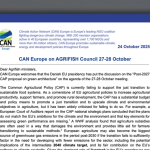Written by Chiara Martinelli, Director at CAN Europe.
As Donald Trump takes the oath of office for his second term as President of the United States, the international community braces for yet another tumultuous chapter in global climate diplomacy. Amongst Trump’s first actions, he is widely expected to initiate the United States’ withdrawal from the Paris Agreement – an announcement that is somehow both simultaneously predictable and shocking. For Europe, this moment demands resolve, unity, and a redoubling of ambition.
The Paris Agreement is more than just a piece of paper. It represents the collective commitment of nearly 200 nations to address a crisis that recognises no borders. This of course also includes the USA, whose citizens are too witnessing escalating climate impacts first hand. By pulling out of the Paris Agreement, the United States, the world’s second-largest current and biggest historic emitter, would undermine not only the agreement itself, but also the spirit of international cooperation that underpins it. The EU cannot afford to let this move derail global progress. Instead, the EU must seize this as an opportunity to fill the leadership vacuum and strengthen alliances with other regions of the world.
A Unified European Response
Europe’s first task must be to reject any notion of backsliding. This is no small feat, with member states’ divergences in risk of being further exacerbated if populist European leaders align themselves with Trump’s fossil fuel agenda. Coordinated public response efforts that emphasise shared goals and mutual co-benefits of climate action can help maintain cohesion, ensuring Europe stands firm in the face of Trumpism.
Moreover, the EU should leverage its economic and diplomatic clout to encourage other leading nations who want to stay the course. Key players, such as the BRICS nations and South Africa as this year’s G20 chair, must use their economic influence to counterbalance US disengagement. Internal EU economic pressures, such as energy price disparities and the strain of balancing decarbonisation with industrial competitiveness, could complicate efforts to maintain a unified EU strategy. By addressing these internal hurdles, Europe can strengthen its leadership and credibility on the global stage – showing the climate action continues, with or without the USA.
The Risks of Inaction
It would be unwise to ignore that Trump’s plans to pull out of the Paris Agreement are symptomatic of broader challenges to the global economic system. The rise of nationalism, the retreat from multilateralism, and the erosion of solidarity are trends that threaten not only climate progress, but the stability of international relations as a whole. The latest Global Economic Forum Global Risks report highlighted last week that escalating geopolitical, environmental, societal and technological challenges are at the centre of concerns which threaten progress and stability.
If Europe falters, the consequences could be catastrophic. Countries that are already wavering in their commitments, including those in Europe, might take Trump’s move as a license to backtrack. Others, particularly those in the Global South, could lose faith in the willingness of wealthy nations to honor their obligations, further widening the trust gap in international climate negotiations.
Turning Crisis into Opportunity
This challenge also presents an opportunity. Europe has long aspired to paint itself as a leader in the fight against climate change and has made significant achievements (despite the further efforts that are required). Now is the time to put those aspirations into action. This means not only meeting existing commitments, but exceeding them. This should include an ambitious approach to climate and energy economic partnerships with key countries, clearer efforts to scale up climate finance, as well as strong diplomatic engagement ahead of UNFCCC COP30.
Through its new Nationally Determined Contribution (NDC), the EU has a unique opportunity to take an approach that is ambitious and aligned with science-based targets. This includes the swift adoption of its next climate plan with a target perspective to 2035 and 2040, demonstrating to the world that Europe’s resolve remains unshaken. We know that the EU NDC will inevitably serve as a blueprint for other regions, and that blueprint must therefore encourage others to align their climate goals with equity, inclusivity, and a safe future climate for all.
The Clean Industrial Deal could be another cornerstone of showcasing how the EU will harness the opportunities of a just net-zero industrial transition – if it indeed contains the necessary clear social and environmental conditionalities. Partnerships with other global climate leaders, including African and Latin American countries, can amplify this transition through shared technology, inclusive policy frameworks, and large-scale investment with clear social and environmental conditionalities that ensure people and planet are put before profit.
A Defining Moment
The stakes could not be higher. Climate change is an existential threat, and every year of inaction brings us closer to irreversible tipping points. Europe must rise to the occasion, not just for its own citizens but for the billions of people around the world whose futures depend on collective action.
President Trump’s inauguration may mark a new chapter in what is a difficult period for international climate diplomacy, but it is not the end of the story. By responding with unity, ambition, and leadership, Europe can turn this moment of crisis into a catalyst for climate action. The Paris Agreement—the planet—and humanity, depend on it.



